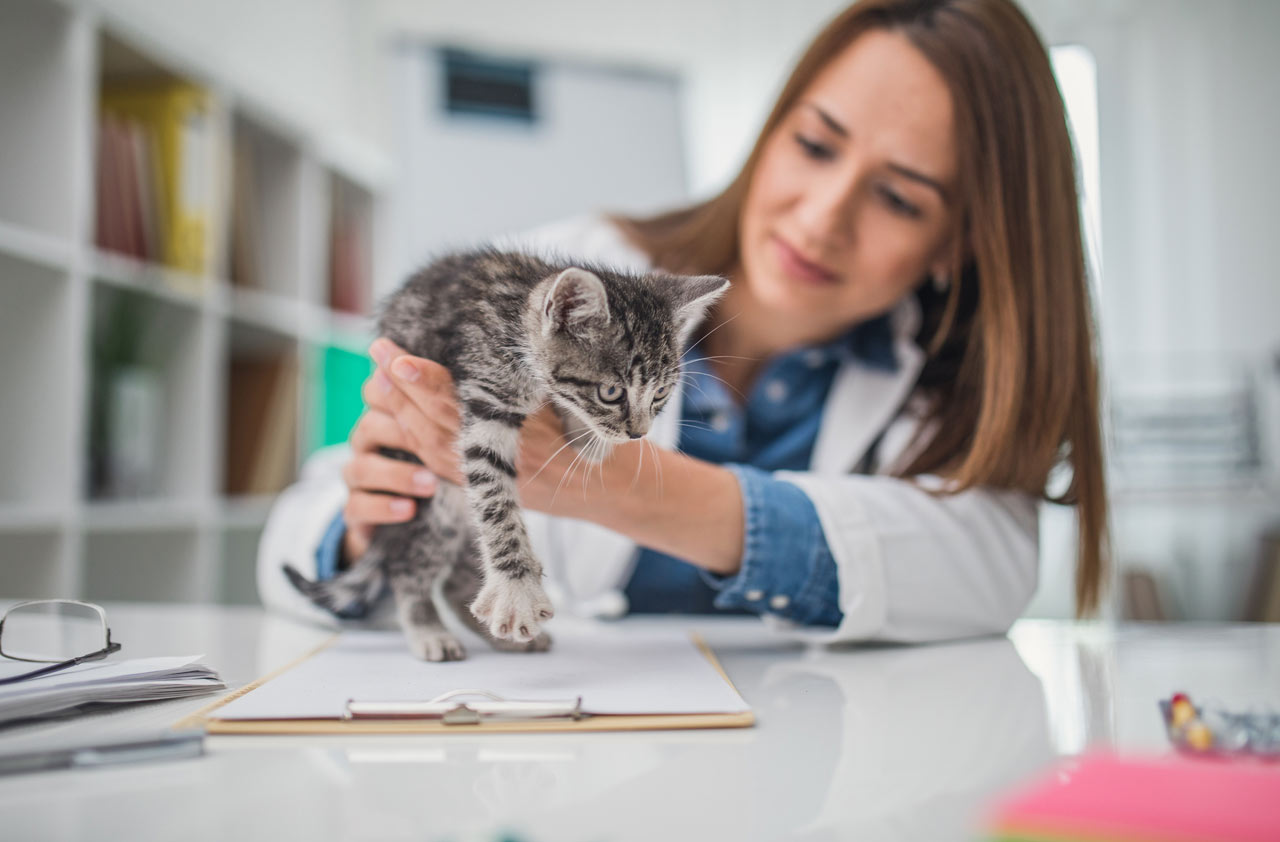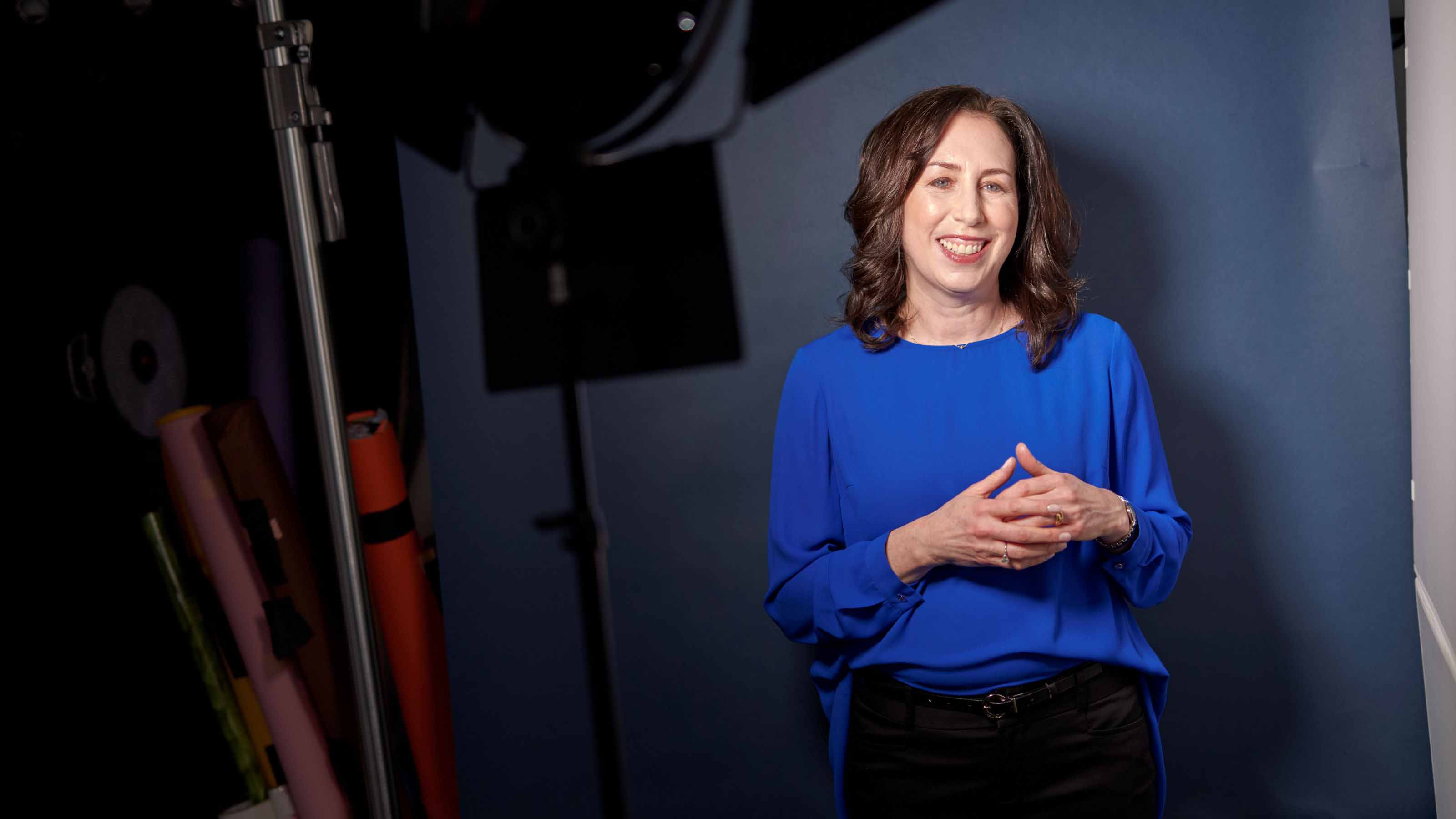PODCAST: Is Pet Insurance a Good Deal?
Associate editor Pat Mertz Esswein joins the podcast to explain the costs and benefits of buying insurance for your pet. Plus, how to save money in the face of rising fuel costs.

Profit and prosper with the best of Kiplinger's advice on investing, taxes, retirement, personal finance and much more. Delivered daily. Enter your email in the box and click Sign Me Up.
You are now subscribed
Your newsletter sign-up was successful
Want to add more newsletters?

Delivered daily
Kiplinger Today
Profit and prosper with the best of Kiplinger's advice on investing, taxes, retirement, personal finance and much more delivered daily. Smart money moves start here.

Sent five days a week
Kiplinger A Step Ahead
Get practical help to make better financial decisions in your everyday life, from spending to savings on top deals.

Delivered daily
Kiplinger Closing Bell
Get today's biggest financial and investing headlines delivered to your inbox every day the U.S. stock market is open.

Sent twice a week
Kiplinger Adviser Intel
Financial pros across the country share best practices and fresh tactics to preserve and grow your wealth.

Delivered weekly
Kiplinger Tax Tips
Trim your federal and state tax bills with practical tax-planning and tax-cutting strategies.

Sent twice a week
Kiplinger Retirement Tips
Your twice-a-week guide to planning and enjoying a financially secure and richly rewarding retirement

Sent bimonthly.
Kiplinger Adviser Angle
Insights for advisers, wealth managers and other financial professionals.

Sent twice a week
Kiplinger Investing Weekly
Your twice-a-week roundup of promising stocks, funds, companies and industries you should consider, ones you should avoid, and why.

Sent weekly for six weeks
Kiplinger Invest for Retirement
Your step-by-step six-part series on how to invest for retirement, from devising a successful strategy to exactly which investments to choose.
Ryan Ermey: We all love our pets, but are you prepared in case something happens to Fluffy or Fido? Associate editor Pat Mertz Esswein joins the show to tell you why pet insurance might be a good idea in our main segment. On today's show, Sandy and I talk saving at the pump in the face of rising gas prices, and I get a lesson on possible changes to a popular tax credit. That's all ahead on this episode of Your Money's Worth. Stick around.
Ryan Ermey: Welcome to Your Money's Worth, I'm Kiplinger's associate editor, Ryan Ermey, joined as always by senior editor Sandy Block. And Sandy, it is summer, it's road trip season. And due to some events that have transpired recently, gas prices are going up. What's happening?
Sandy Block: That's right. Well, there was this big fire at the refinery in Philadelphia which may never reopen. There's tensions with Iran, and it's summer time, and in summer more people drive, and there's more demand for gas. So gas prices while not crazy high, they are inching higher. And if you're planning a road trip, that is going to affect how much it's going to cost you.
From just $107.88 $24.99 for Kiplinger Personal Finance
Become a smarter, better informed investor. Subscribe from just $107.88 $24.99, plus get up to 4 Special Issues

Sign up for Kiplinger’s Free Newsletters
Profit and prosper with the best of expert advice on investing, taxes, retirement, personal finance and more - straight to your e-mail.
Profit and prosper with the best of expert advice - straight to your e-mail.
Ryan Ermy: So if I'm driving across the country, are there certain strategies that I can employ that will keep my bill at the pump down?
Sandy Block: Yes. I mean, we don't really recommend driving across town to save 4 cents on gas. Don't be that guy. It's annoying. But if you are driving and you're crossing state lines, where you gas up could make a big difference because there's such a variation in state gas taxes. The federal gas tax, which is 18.4 cents per gallon, hasn't changed since the '90s, but state gas taxes go up all the time and several states are hiking their gas tax today, July 1st. The most notable one being Illinois, starting today, their gas tax is going to jump from 19 cents a gallon to 38 cents a gallon.
Ryan Ermey: Holy moly.
Sandy Block: California is going to be the highest, it was already the second highest, it's going to have the highest gas tax in the country. It's going to jump to 57.8 cents per gallon, which is why California's always the top of this list.
Ryan Ermey: Wow.
Sandy Block: So if you're driving across country, say you're driving from Missouri to Illinois, gas up in Missouri because in Missouri the gas tax is only 17 cents. It's going to make a big difference in what you pay, particularly if you fill up. And we give lots of examples in our July deals, deals, deals, story, where just crossing state lines can save you money.
Ryan Ermey: I mean, I am part of a number of people I know that on shorter road trips in my youth would cross state lines before gassing up because I wanted to gas up in my native New Jersey because I'm not so great at pumping gas. Those of us who, I mean, for people who don't know, in New Jersey, all gas stations are full service, they pump them for you. So us Jersey kids, I've legitimately pumped gas less than a dozen times in my life.
Sandy Block: You probably don't know what side it's on.
Ryan Ermey: Oh, look, there's a little arrow next to the little picture of the gas pump on your gauge that shows you what side it's on. I've never had to pull the hose over the side of the [car].
Sandy Block: Well, Jersey is an interesting case because for years and years and years it had the lowest gas taxes in the country and everybody would fill up there, not because they pumped gas for you, although maybe that's a perk, but because it was so cheap. Well, a couple of years ago, many states, their roads were a mess. So one of the easiest ways to raise money and it's effectively raising money from the people who use the roads is to raise the gas tax, and New Jersey raised its gas tax. So it's no longer such a great deal, but what is a good deal in that direction is Delaware, charges just 23 cents a gallon, whereas in Pennsylvania it's 59 cents a gallon. So it's a very good chance if you're traveling through the East coast, you're going to pass through those two states. Well, gas up in Delaware, even if you have to pump it yourself.
Ryan Ermey: Right. And then when it comes to more general advise, I mean, this is something that we've covered variously in the magazine and online. We like the GasBuddy app still as an app that, it's crowdsource that lets you know the gas prices nearby. Obviously we tell you, don't go driving around town burning gas on route to saving 3 cents a gallon, but if you're on the road trip maybe look to fill up at wherever is cheaper. And by the way, also it makes sense to start thinking about filling up again when you get down to a quarter, even an eighth of a tank. I used to drive it down to when the needle was way past the E, throw it in neutral on downhills, that kind of a habit.
Sandy Block: We had a boat of a car when I was a teenager that when it was on E, it was E. There was no reserve. It just stopped. If it hit E, you were done.
Ryan Ermey: I've also seen, I think we've, I mean, we will put all of our coverage on this in the show notes. I've also seen that the prices tend to fluctuate even at individual stations, during rush hour they can charge a little bit more than if you go early in the morning or late at night. So maybe right before you're about to check into your hotel, it might be a good time to gas up. And then the last thing I'll mention is that there are plenty of credit cards that reward you at the pump. It's one of these categories of spending that tends to be part of rewards programs. We will link to our list of all of our favorite credit cards. The one that comes to mind, we have the Chase Freedom card in there. They have cash back in rotating categories. But in the first quarter of this year, you could have gotten 5% cash back...
Sandy Block: On gas.
Ryan Ermey: ... on gas.
Sandy Block: Yeah. That's pretty good.
Ryan Ermey: So that's discount in of itself. So keep an eye out for all that stuff in the show notes. And if you're taking a road trip this summer, make sure you don't overpay at the pump.
Ryan Ermey: If your dog eats something he's not supposed to, the vet bill may be hard for you to digest. We're talking pet insurance with Pat Mertz Esswein next.
Ryan Ermey: Welcome back, and welcome back to the pod associate editor, Pat Mertz Esswein who joins us today on a topic that I think a lot of people really care about. It seems to me more and more people are devoting more time and money and energy and love, of course, to their pets. So today we're talking about the costs associated with owning a pet and specifically pet insurance. So Pat, thank you for coming on.
Pat Mertz Esswein: Sure thing.
Ryan Ermey: So why is pet insurance such a big deal? What kind of cost are we talking about in the case that your pet gets hurt or sick?
Pat Mertz Esswein: Well, to start with, even routine care can be a few hundred dollars out of your pocket occasionally or annually. But if your animal develops an infection, say an ear infection or a urinary tract infection, that can cost you up to $300 for vet care. If your dog eats something that he shouldn't, the average cost of vet treatment could be about $1500, which is painful for the owner.
Ryan Ermey: Eye popping.
Pat Mertz Esswein: And if your cat has bladder stones, it can cost you up to almost $2,000.
Sandy Block: Oh my goodness.
Pat Mertz Esswein: So it's really, it can be a real substantial cost.
Sandy Block: I have a friend whose dog ate his leash, and they had to take out a home equity line of credit to pay for the massive amount of surgery it was required to... He lived, but they went into debt. I mean, it got very expensive.
Pat Mertz Esswein: Well, when we wrote about pet insurance, I actually talked with a couple, and this is kind of a worst case scenario too, their dog broke away from them during a walk and ran out into the highway and was hit. And the total vet bill for the dog's hospital stay and care was about $4,000.
Sandy Block: Oh my goodness.
Ryan Ermey: Yeah. Well at least they got the, at least they got to keep their dog. When a dog runs onto the highway, that's not always the case. So I mean, I think it should be self evident at this point that if you're looking to avoid paying that kind of money if something happens to your pet, insurance makes sense. But what do the plans typically cost, and what do and don't they typically cover?
Pat Mertz Esswein: What you're going to pay for pet insurance depends on the age of your pet, it's breed, where you live, and the type of coverage that you select. Generally speaking, you'll pay about $30 to $150 a month for a dog, and from $10 to $50 a month for a cat. Most plans cover accidents and illnesses, but they don't cover routine exams and care. So if your cat needs a dental cleaning, or you're taking your animals for annual checkups and vaccinations, pet insurance probably won't cover that, although you can probably add wellness coverage for an additional premium.
Sandy Block: Yeah. I think that's a good point, Pat, in that people think health insurance, and they think the health insurance you get for people, but usually health insurance plan will cover your checkups, and it'll cover preexisting conditions. But with pet insurance, that's not necessarily the case. Right?
Pat Mertz Esswein: That's true. So it's smart to sign your dog or cat or your pet up when they're young and they're healthy before they have any or develop any preexisting conditions. Pet insurance also won't cover hereditary or congenital conditions. So a lot of dogs, depending on the breed and the size, may develop hip dysplasia, and pet insurance isn't going to cover that probably.
Sandy Block: So say you decided that this is a good idea, and what I've heard oftentimes it's a good idea if you have more than one pet because your costs could go up. How do you shop for a good policy?
Pat Mertz Esswein: One of the ways that you can do it is to ask for recommendations from friends or talk to your vet, but you can also go online. There are a couple of websites that are really useful. One is petinsurancereview.com, and the other is petinsurancequotes.com. And they both offer comparisons of various pet insurance plans. So that's a great place to start.
Ryan Ermey: And what are the things that you should be looking for in a plan? The fine print things that really set one plan apart from another.
Pat Mertz Essyn: Well, the first thing you want to look at is the reimbursement rate. The plans typically reimburse you for 60% to 90% of your cost. And of course, the better the coverage, the higher the premium.
Ryan Ermey: Sure.
Pat Mertz Esswein: Another thing to look at are the deductibles and the maximums. So there might be a deductible, an out of pocket cost that's either an annual deductible or a per incident deductible. And then plans can also have maximums it'll pay for each incident per year or over the pet's lifetime.
Sandy Block: Let's say you've decided that you don't want to shell out for pet insurance. Maybe your dog does have a congenital condition that's not, doesn't make it a good idea for you. What are some other ways that you can at least lower the cost of veterinary bills?
Pat Mertz Esswein: One thing you can do is talk with your vet. They may actually be willing to negotiate with you to some extent, if you're in a hard or a bad place, they might lower the price of care for you. Another thing you can do is look at, what's known as a veterinary discount plan. One that I've come across is petassure.com. And with that plan, with that membership plan, participating vets will give you a 25% discount on all medical care that's provided in the office by their staff. With Pet Assure, if you choose the family plan for two to four pets, you'll pay $149 a year. So that's one way to do it. Other than that, then it gets into maybe how to save on medicines.
Ryan Ermey: Because these things, I mean, they pile up, they make you buy a ton of stuff.
Sandy Block: Yeah. And as is the case with people drugs, shouldn't you ask if there's a generic version or... What I've found, and I've owned a bunch of dogs, is that buying the meds from the vet is often the most expensive way to get them. Sometimes you can order them online for a much lower cost. And the other thing I've found is that geography matters, sometimes, and in an emergency this isn't going to work. But if you need surgery for a dog's knee or something like that, sometimes getting out of the major metro area can save you thousands of dollars because there is, since most people don't have insurance, that's basically charged what their markets will bear.
Pat Mertz Esswein: That's a great idea.
Ryan Ermey: So how do you save on the drugs, Pat?
Pat Mertz Esswein: So like Sandy said, ask the vet if there's a generic that they can prescribe. If there isn't a generic, there may be a human equivalent that you can get at the drug store that might be less expensive. You should always shop. So with a prescription in hand from the vet, you can call around to local pharmacies or you can check on the website, goodrx.com. For routine preventive maintenance if you will, say for flea and tick prevention or heartworm, check at the local big box stores like Walmart and Costco. There're also some online sites like chewy.com, petsmart.com, PetCareRx, and 1-800-PetMeds.
Ryan Ermey: So do you have pets yourself?
Pat Mertz Esswein: Yeah, we have two cats. One is Lucy. She's fine. We have a kind of sort of Russian blue named Ivan. He's our big boy and he is a diabetic, so he requires injectable insulin, which is something I swore I would never do, but here I am.
Ryan Ermey: That's what people are willing to do. I had a roommate who had two cats, one also a very, very large one. And the other one healthy, I mean, I think at least physically, but I mean, I don't know if there's such thing as mental health for cats.
Sandy Block: Oh yes.
Ryan Ermey: This thing used to run into the furniture man, but do you insure your pets?
Pat Mertz Esswein: No, we don't. But as a result of preparing for this podcast, I've decided I'm going to check out the veterinary discount plan and I'm going to shop Ivan's insulin. I've been buying it from a local pharmacy, but it occurred to me, maybe I can get it cheaper someplace else.
Sandy Block: Ivan wiill never know.
Pat Mertz Esswein: No. He won't know.
Ryan Ermey: And he never has to shop around.
Pat Mertz Esswein: As long as we provide the food.
Sandy Block: That's right.
Pat Mertz Esswein: ... Ivan doesn't care about anything.
Ryan Ermey: All right, well listen, thank you for coming on, Pat. It's been absolutely enlightening, and I'm sure everyone with a pet that they love out there will really appreciate it.
Pat Mertz Esswein: Good deal.
Ryan Ermey: Positive changes could be coming to an already lucrative tax credit. Sandy explains how you can take advantage after the break.
Ryan Ermey: We're back, and before we go, there has been some tax news. Whenever there's tax news an alarm begins going off in Sandy's office.
Sandy Block: I get so excited.
Ryan Ermey: So I was hoping that you could explain this to me like I'm five because I don't quite understand what's going on, but apparently, there is some perspective legislation involving a popular tax credit.
SEE ALSO:
Income Thresholds for Saver’s Credit
p>
Sandy Block: Well, unfortunately it's not popular enough. It's the saver's tax credit. It's been around for a while, and the purpose of this is to encourage the low income, moderate income people who think they can't afford to invest in a Roth or a 401(k) or a regular IRA. It's a very lucrative tax credit to offset the cost of savings. And basically, depending on your income and how much you can put away, you could get a tax credit of up to $1,000. If you put away $2,000 in a Roth or a 401(k) or an IRA, you could get a tax credit. And remember, a credit is a dollar for dollar reduction in your tax bill. So you could get a really nice refund and save for retirement at the same time. Unfortunately, only about 25% of people who are eligible for this claim it. And I think it probably is because when you look at the income levels, these are people who just say, "I can't afford to save anything."
Sandy Block: You don't have to save a thousand. You can save less. And there are, it's graduated how much credit you get. You could get a 50% credit if your income is higher. There's a bill pending in the Senate that would do two things. It would increase the eligibility so more people could take advantage of this credit, and it would make it at least partially refundable, which means that if the credit was so large that it wiped out your tax bill, and that's possible. If you get $1,000 credit, you may not owe $1,000, you would get that back. You basically get paid to save. So I think this is something we'll be watching, but I wouldn't wait for the Senate to act. If you hear this, read our show notes and realize that you qualify for the saver's tax credit, and we'll put all the income levels in the show notes. You can still amend your tax return, put the money in a Roth or a 401k or a regular IRA, amend your tax return, claim the credit, and you'll get a bigger refund.
Ryan Ermey: So how might I, a five year old, but man, I'm not actually five, a grown man with the understanding of concepts of a five year old, go back and amend my tax returns?
Sandy Block: There is a form that you can get online. Just go to irs.gov and look for, we'll put the link to that too. But basically, you amend the tax return, you basically do it again, but this time you claim the saver's tax credit. So you, you can do this, software will do this for you as well. I think you could probably do it on your IRS free file site too.
Ryan Ermey: And to hash out what's available now, it's generally for pretty low income people, and as of now, it's a non refundable credit, meaning that instead of paying you back in excess, if you're supposed to get back more than what you owe, it just brings it to zero.
Sandy Block: Right. Basically, once you wipe out your tax bill, you're done. So even if you were eligible for $1,000 credit but you only had to pay $500 in taxes, that's all you get. What this bill is proposing that you would... And there are some other tax credits that do this, that basically pay you if the credit exceeds the amount that, your tax liability. So that's, again, that's something we're, but I wouldn't wait for the Senate to act if you think you might qualify. And it's low income people. Actually for the lower amounts of the credit, the 15 or 20%, it is more a moderate income. And the other group of people who should take a hard look at this are part-time workers. You might be retired and working part-time, you might qualify for it, or maybe you're a stay at home mom or dad and you have some freelance income or something like that. You may very well qualify for this credit and you could put some money in to save for retirement.
Ryan Ermey: No. I mean, listen, if there is an ethos around what we do in this podcast is if there is free money to be had-
Sandy Block: Go get it.
Ryan Ermey: .. go out there and take it. You might, if it's on the street, you pick it up, and if it's across the street on the other sidewalk, you may even have to walk across the street, jump through a couple hoops, but get your money people.
Ryan Ermey: That's it for this episode of Your Money's Worth. For show notes and more great Kiplinger content on the topics we discussed on today's show, visit kiplinger.com/links/podcasts. You can stay connected with us on Twitter, Facebook or by emailing us at podcast@kiplinger.com.
Links and resources mentioned in this episode
Profit and prosper with the best of Kiplinger's advice on investing, taxes, retirement, personal finance and much more. Delivered daily. Enter your email in the box and click Sign Me Up.

Block joined Kiplinger in June 2012 from USA Today, where she was a reporter and personal finance columnist for more than 15 years. Prior to that, she worked for the Akron Beacon-Journal and Dow Jones Newswires. In 1993, she was a Knight-Bagehot fellow in economics and business journalism at the Columbia University Graduate School of Journalism. She has a BA in communications from Bethany College in Bethany, W.Va.
-
 The New Reality for Entertainment
The New Reality for EntertainmentThe Kiplinger Letter The entertainment industry is shifting as movie and TV companies face fierce competition, fight for attention and cope with artificial intelligence.
-
 Stocks Sink With Alphabet, Bitcoin: Stock Market Today
Stocks Sink With Alphabet, Bitcoin: Stock Market TodayA dismal round of jobs data did little to lift sentiment on Thursday.
-
 Betting on Super Bowl 2026? New IRS Tax Changes Could Cost You
Betting on Super Bowl 2026? New IRS Tax Changes Could Cost YouTaxable Income When Super Bowl LX hype fades, some fans may be surprised to learn that sports betting tax rules have shifted.
-
 PODCAST: Tax Breaks for College Finance with Kalman Chany
PODCAST: Tax Breaks for College Finance with Kalman ChanyPaying for College Paying for (ever-pricier) college is a challenge that this consultant meets head on with highly specific guidance.
-
 PODCAST: Car-Buying in an Inflated Market with Jenni Newman
PODCAST: Car-Buying in an Inflated Market with Jenni NewmanBuying & Leasing a Car With cars both scarce and expensive these days, what to do if you want – or need – a new ride? Car-buying strategist Jenni Newman of Cars.com shares some tips. Also, more on the magical 9% savings bond.
-
 PODCAST: How to Find a Job After Graduation, with Beth Hendler-Grunt
PODCAST: How to Find a Job After Graduation, with Beth Hendler-GruntStarting Out: New Grads and Young Professionals Today’s successful job applicants need to know how to ace the virtual interview and be prepared to do good old-fashioned research and networking. Also, gas prices are high, but try a little global perspective.
-
 PODCAST: Is a Recession Coming?
PODCAST: Is a Recession Coming?Smart Buying With a lot of recession talk out there, we might just talk ourselves into one. We take that risk with Jim Patterson of The Kiplinger Letter. Also, dollar stores: deal or no deal?
-
 PODCAST: This Couple Tackles Love and Money as a Team
PODCAST: This Couple Tackles Love and Money as a TeamGetting Married Fyooz Financial, the husband and wife team of Dan and Natalie Slagle, have carved out a niche advising other couples with the money questions that come with pairing up. Also, where is this troubled stock market headed?
-
 PODCAST: Which Documents to Keep, Which to Shred and Which to Scan
PODCAST: Which Documents to Keep, Which to Shred and Which to Scanhome insurance A speedy recovery from disaster can depend on your recordkeeping. Kiplinger’s Personal Finance writer Rivan Stinson tells us how to get our papers in order.
-
 PODCAST: High Gas Prices with The Kiplinger Letter’s Jim Patterson
PODCAST: High Gas Prices with The Kiplinger Letter’s Jim Pattersoncars Why are we paying so much more at the pump? How long will it last? What can you do? Plus: Congress is making changes to retirement-savings rules again.
-
 PODCAST: The Future of Certified Financial Planners with Kamila Elliott
PODCAST: The Future of Certified Financial Planners with Kamila ElliottBecoming an Investor CFPs will tell you (and we’d agree) that not all financial advice is the same. We talk with the chair of the CFP Board about what she’s doing to preserve her organization’s brand and extend its reach. Also, the right way to file your tax returns for free.

